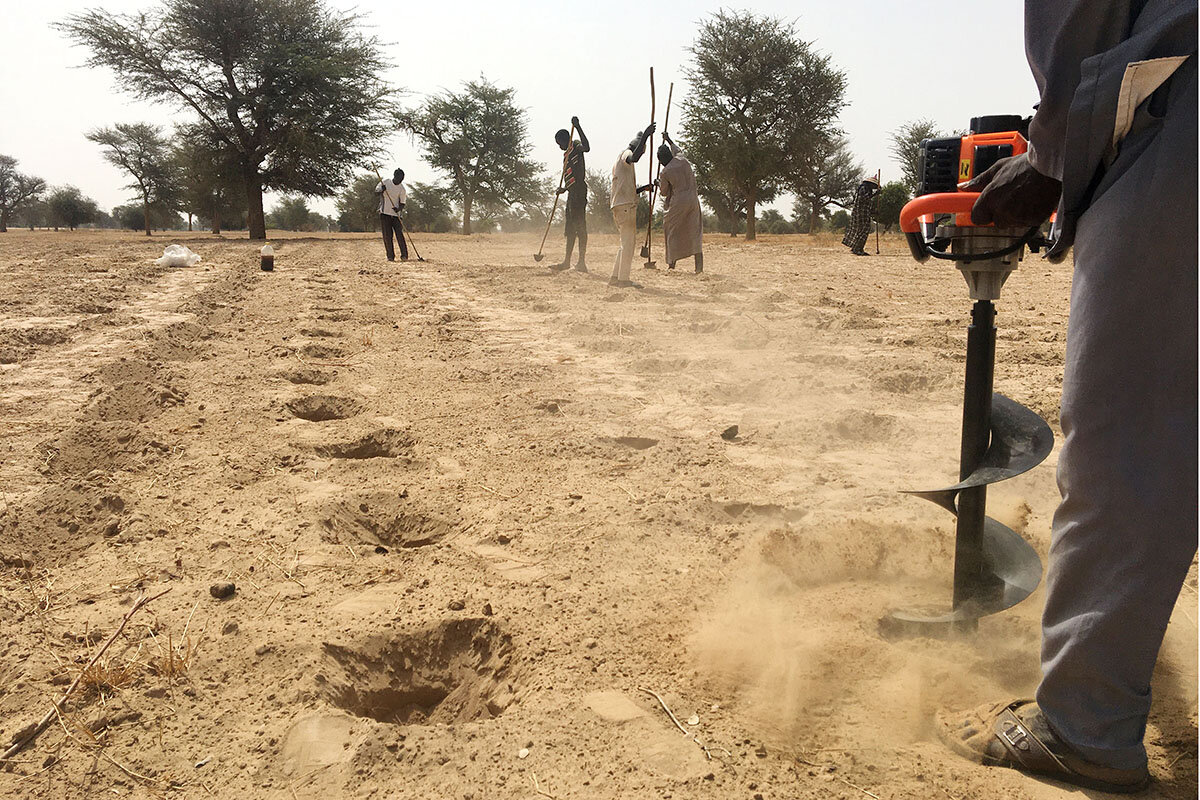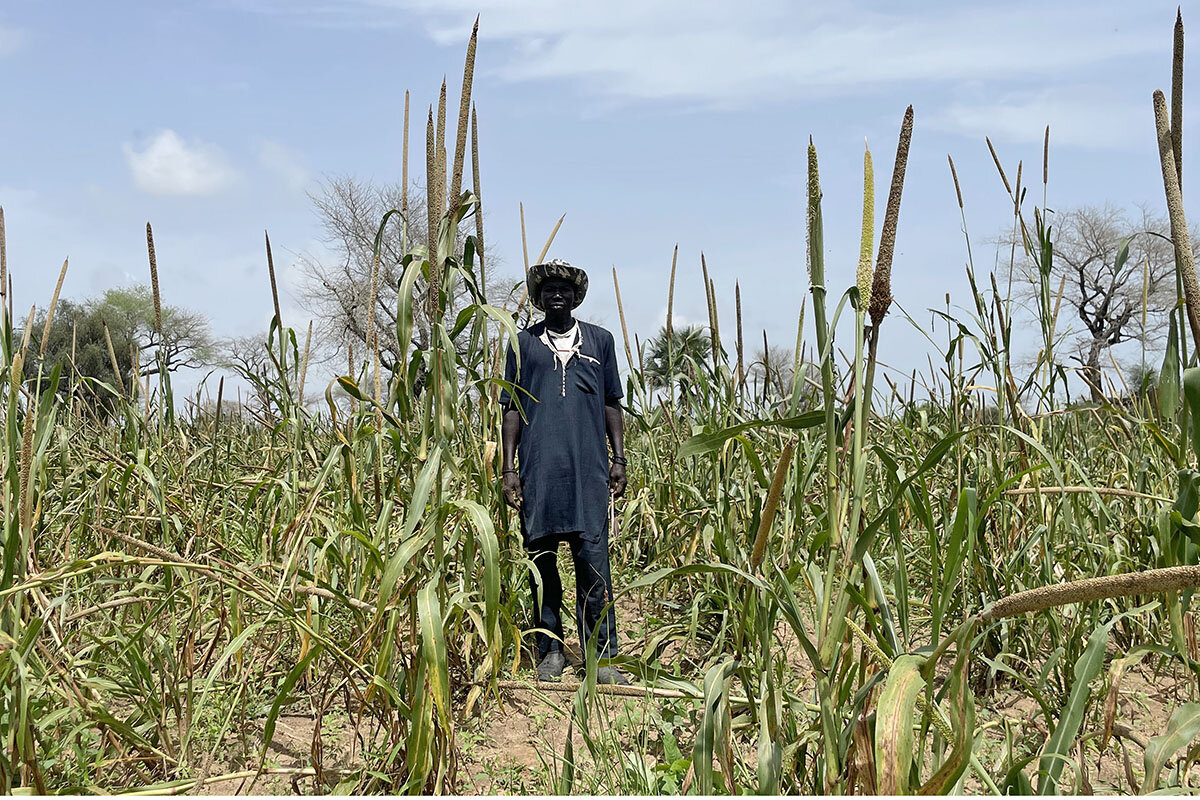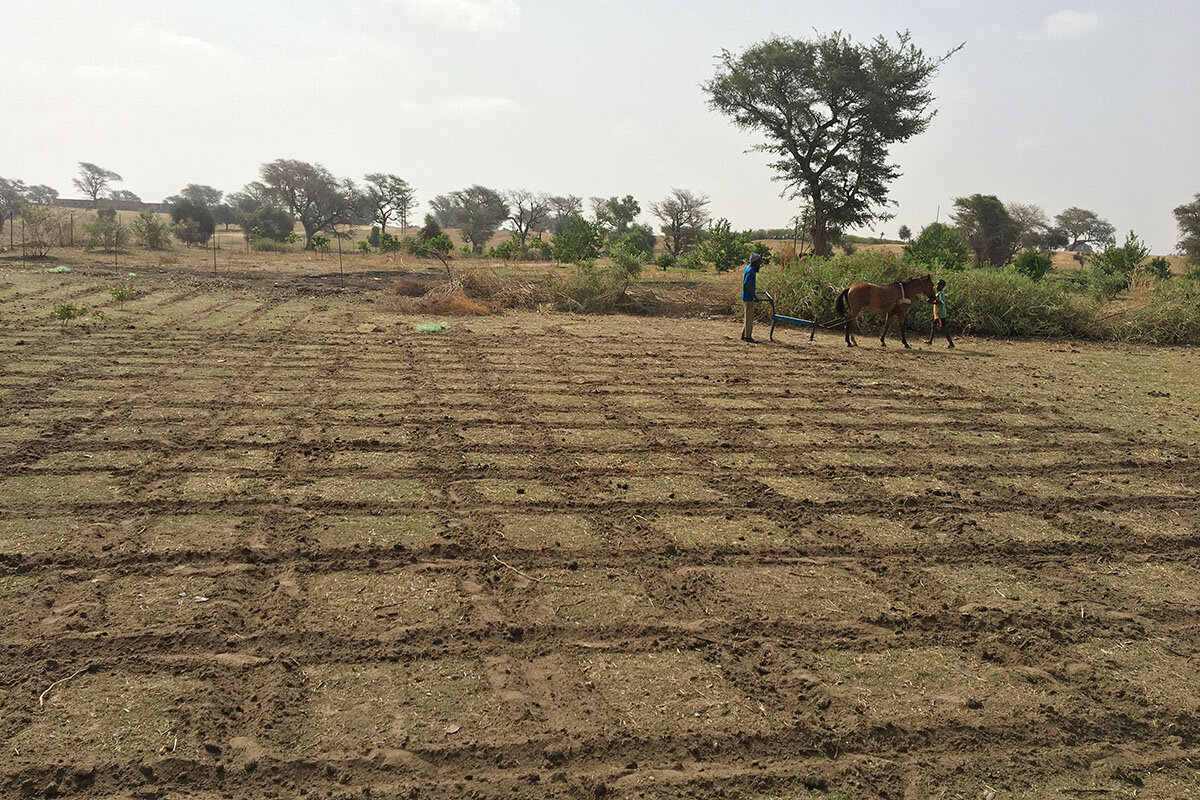At Sahara’s edge, old habits protect crops from new climate
Loading...
| NDIOB, SENEGAL
Rain is like alchemy for farmer Thialla Badiane in the Sahel region of Senegal. Suddenly, it transforms dusty dunes into rich verdure, barren plains into crop-laden fields.��
But rain is increasingly scarce here on the edge of the Sahara desert. Temperatures are rising by and threatening Mr. Badiane’s most precious resource to feed himself and his seven children.��
Annual rainfall could drop by in the coming decades, a threat to the way of life for the nation’s 8 million farmers.��Already the growing climate emergency means rainfall has become more unpredictable, water scarcer, and droughts longer.
Why We Wrote This
As policymakers and governments worldwide scour for ways to cope with the climate emergency, a small town in Senegal shows that solutions can come from those closest to the effects.
So in Mr. Badiane’s hometown of Ndiob, hundreds of farmers seeking to combat those effects have revived an ancient farming technique – with a 21st-century twist.��
A blaring engine resounds across the arid landscape of Mr. Badiane’s plot, punctuated only by hardy acacia trees and thick-trunked baobab trees, as he drills repeatedly into the thick crust of the earth with a giant motor-powered corkscrew, leaving a pattern of perfectly spaced holes. In one hectare, he will drill 10,000 holes for his millet seeds, a planting technique known as ����ï.��
Originally from neighboring Burkina Faso, ����ï is the traditional technique of making small indentations in the ground that capture rainfall and increase the fertility of the soil. It’s painstaking work, but a lot easier than digging the holes by hand with a hoe.
“When we did it manually, I couldn’t bear to come back in the afternoon,” bellows Mr. Badiane over the roar of the engine. “It would take days.”
Indigenous inspiration
Millet has been making waves on the international stage. The United Nations hailed 2023 as the “year of millet” because the crop can grow on arid land, can survive extreme heat, and is high in protein and micronutrients.
And with his modern take on an ancient practice, Mr. Badiane has increased his yield of millet by 50% – though research shows ����ï ��������. If it were to become widespread, this Indigenous technique could help farmers become more resilient to a changing climate, growing food without chemicals and reducing Senegal’s heavy reliance on food imports.
This is the ambition of Ndiob’s Mayor Oumar Ba, renowned in Senegal for his commitment to agroecology, a form of sustainable farming based on millennia of Indigenous knowledge and innovation.��
Until now, ����ï has taken too much time to be popular.��But 500 farmers in Ndiob, supported by Mr. Ba, are re-imagining the ancient practice, experimenting with earth auger drills to make it more efficient and appealing to farmers.��
Africa is the continent that will feel the effects of climate change most strongly. And its people have the least support to adapt to its knock-on effects – including , hunger, displacement, and conflict.
Across the continent, many officials, scientists, and ordinary citizens are already looking to adapt. Faced with increasingly unpredictable weather in Ndiob, Mr. Ba traveled to Burkina Faso, a landlocked nation that gets even less rain than Senegal, to search for ways to beat intensifying drought. Four years ago, he brought back ����ï.��
“Before, it used to rain consistently for five months; it would start in June and end in November,” says the mayor’s agricultural advisor, Mame Kor Faye. “Now, not one farmer can tell you when the season will start. This is very worrying for farmers who have been used to farming the same way for generations.”
Drought is a vicious circle for farmers: As rainfall decreases, the soil compresses. When it finally does rain, the dehydrated, packed land cannot absorb the water and the top layer of fertile topsoil washes away. Z��ï combats this by creating pockets for the water, making sure it doesn’t run off and take nutrients and minerals with it.��
“Z��ï is a solution to this scarcity of water and to restore the fertility of our soils,” Mr. Faye says.
A double win
For Mr. Badiane, the planting plots are a double win.��
Under the burning November sun, he bends over each small pit and delicately places a handful of rich, dark fertilizer. It’s a far smaller amount than he used when he composted his entire field.��
Prices of fertilizer have skyrocketed since Russia, the world's top exporter, invaded Ukraine and supplies were squeezed. Since then, animal manure, an alternative to chemical fertilizer, has been in short supply.
“The reason ����ï interested me is because I wanted to save on organic manure,” Mr. Badiane says.��“Before, you didn’t have to pay for manure – livestock herders would give it to you. Now it’s hard to find, and you have to pay.”
“When the rain falls on the manure, it retains the humidity that the plant needs,” says Isidore Diouff, an agronomist from the Senegalese nongovernmental organization Enda Pronat and who has been leading the ����ï experiments in Ndiob. He kneels down to inspect a newly planted seed in its pit. “You can go 20 days without rain, and the pit will still be damp.”
Four months later, Mr. Badiane admires his ready-to-be-harvested, fingerlike plants. Nurtured by the moist soil, their soaring leaves tower over the 6-foot-tall farmer. Assessing the plant’s density and weight, Mr. Badiane predicts a good yield.��
Despite increasing his millet harvest, Mr. Badiane is not done improving yet. His drill, for example, is better than a hand hoe, but it is still not well adapted to soil as dry as his field has become. And he hopes to see more fruit from his labor.
“I farm to send my seven children to school, to feed them, to heal them when they’re sick,” he says. “One day, I want to be able to buy my son a bike.”







